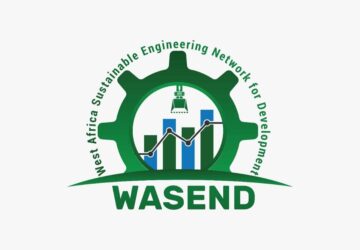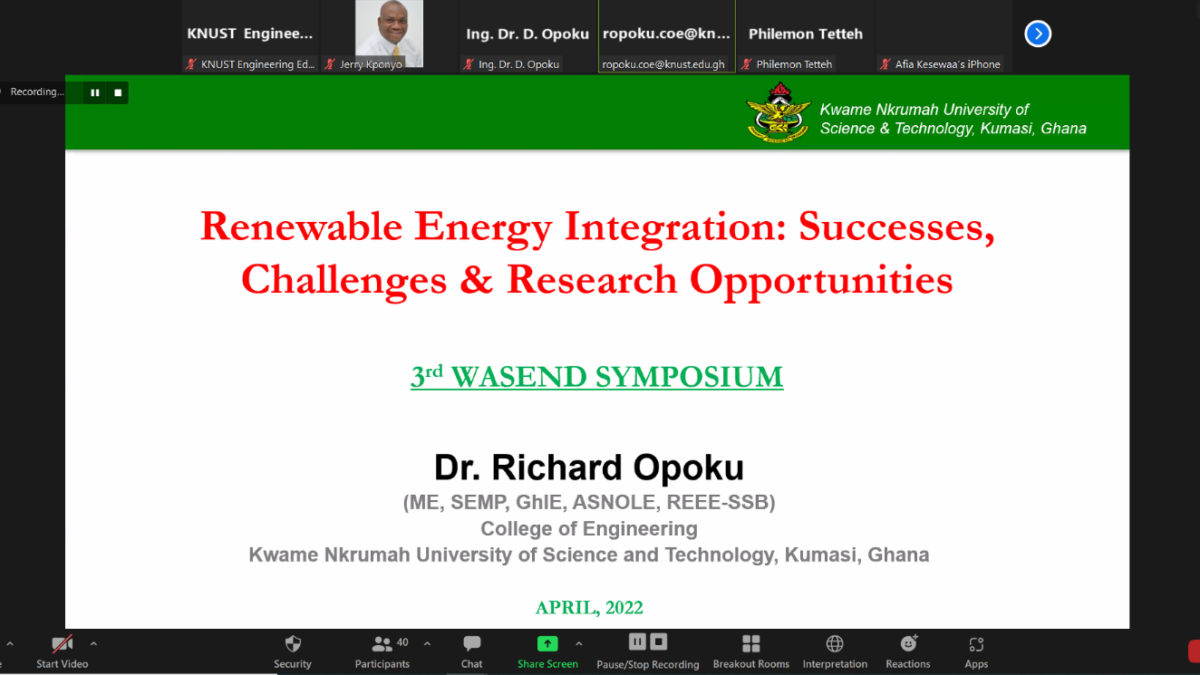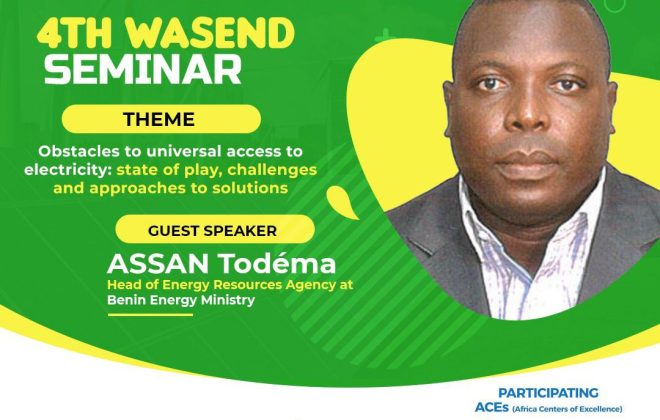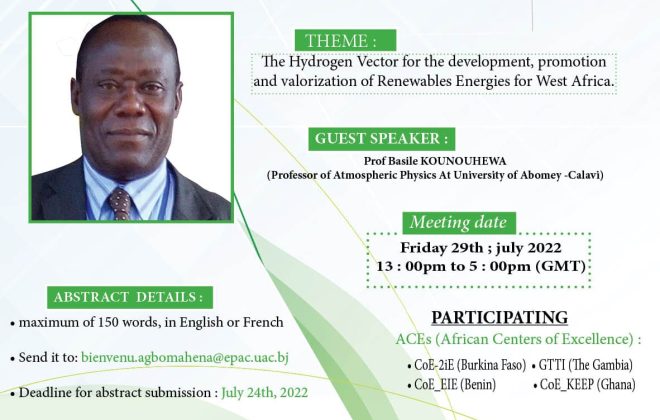COLLEGE OF ENGINEERING, KNUST HOSTS THE THIRD WASEND SYMPOSIUM
The West Africa Sustainable Engineering Network for Development (WASEND) held its 3rd Symposium on Friday, 29th April 2022 from 12:00pm – 5:00pm (GMT) via zoom on the theme “Renewable Energy Integration: Successes, Challenges and Research Opportunities”.
Fifty-Six (56) participants joined the third symposium hosted by College of Engineering, KNUST in Ghana.
The aim of the symposium was to equip WASEND members with knowledge in renewable energy integration and also to give the opportunity to postgraduate students to present their research outcomes for comments and inputs from faculty members and industrial players present at the symposium.
Participating ACEs (African Centers of Excellence) were:
- College of Engineering, Kwame Nkrumah University of Science and Technology (KNUST).
- International Institute of Water and Environmental Engineering (2IE), Burkina Faso
- University of Science, Engineering and Technology, Gambia
- College of Engineering, University of Abomey Calavi, Benin
The Guest Speaker was Dr. Richard Opoku, a Senior Lecturer at the Department of Mechanical Engineering, KNUST. He is a certified Sustainable Energy Management Professional and an Energy Consultant with experience in research and development. He also has over 10 years’ experience in capacity building and training of facility managers on energy efficiency and renewable energy. His presentation covered the sources of electricity generations and emissions, Electricity Portfolio in Africa, Electricity Access in West Africa, Electricity Generation Mix in West Africa. Renewable Energy Policy in West Africa, Challenges of Renewable Energy Electricity Supply in West Africa and Research Opportunities available.
Please click https://docs.google.com/presentation/d/1CIWpdfJd6774yXkQl0-P-IiB4EYnArKH/edit?usp=sharing&ouid=100843132195621956409&rtpof=true&sd=true to view the presentation.
Nine (9) postgraduate students under the various Colleges of Engineering gave presentations on the underlisted topics:
- Estimation of GHG emissions using a sensor approach: The case of Suame Industrial Complex (Ibrahim Hamidu)
- Optimal production site of a photovoltaic energy source exposed to climatic conditions using a GIS: case of the plateau department of Benin. (Jules Gnagbolou)
- Prévision par l’intelligence artificielle de la variabilité de la puissance de sortie d’un générateur photovoltaïque installé sur le territoire Béninois / Prediction by artificial intelligence of the variability of the output power of a photovoltaic generator installed on the Beninese territory (Audace Babatounde)
- Modelisation Physique D’une Voilure A Axe Verticale Pour La Production D’energie Eolienne / Physical Modeling of a Vertical Axis Airfoil for Wind Power Generation (Ibrahim Lopez)
- Effet du rayonnement et du champ magnétique dans le processus de la diffusion des contaminants à travers le sol, canal poreux horizontal / Effect of radiation and magnetic field in the process of diffusion of contaminants through soil, horizontal porous channel (Issiako Faras)
- Analyzing The Effect of Spiral Distribution System of the Heliostat Field Layout with Optimized Dual Axis Solar Tracking System on the Performance of Concentrating Solar Power Tower. (Acheampong Kwarteng Joseph)
- Techno-Economic Assessment of The Viability of Commercial Solar PV Systems in Port Harcourt, Nigeria (Muzan William)
- A study of energy improvement through solar PV and tracking system. (Rahimat Oyiza Yakubu)
- Investigating activated carbon/grapheneoxide/TiO2 composite electrode material for high performance supercapacitors (Fuseini Abdallah)
Dr. Chux Daniels, a member of the WASEND Network Advisory Board and Dr. Victor Ayisi Atiemo-Obeng, a member of the KNUST Engineering Education Project (KEEP) Industrial Advisory Board joined the symposium to give their inputs and comments on the various presentations.
The Network Coordinator for WASEND, Prof. Jerry John Kponyo in his closing remarks thanked all presenters for their insightful presentations. He thanked the Advisory Board members who took time off their busy schedules to be part of the symposium, participants from the Association of African Universities and the translation team for their translation services.





